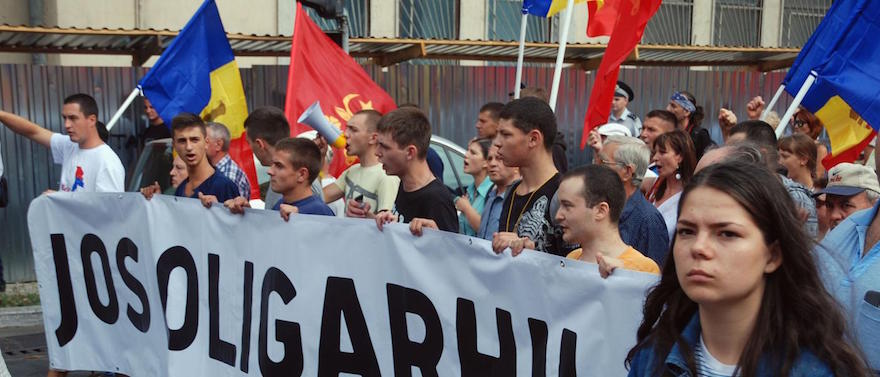By Alina Inayeh* | IDN-InDepthNews Analysis
BUCHAREST, Romania (IDN | GMF) – History repeats itself, giving us the chance to avoid repeating our mistakes. The Ukrainian story should have taught us a lot about the short-sightedness of supporting a bad government for geopolitical reasons.
Now, as protests against Moldova’s newly formed government are drawing many thousands, is the moment for political leaders in Europe and the United States to take a deep breath and recall this lesson before showing their support to the Moldovan government, known to be controlled by the country’s most powerful oligarch and with little, if any, credible interest in promoting the reforms Moldova needs.
The simplifying view that divides Moldovans into pro-Europeans and pro-Russians is not helpful; nor is supporting the first to the disadvantage of the latter. This binary thinking will, again, lead us to forget the essential point: in order to progress, the country needs neither a pro-European, neither a pro-Russian, but a pro-Moldovan government.
Over a 12-month span, Moldova has drifted from being the most promising country in Europe’s neighbourhood to a political disaster. The disappearance of €1 billion from one of Moldova’s banks and the subsequent investigation that implicated the country’s top politicians revealed the level of corruption and poor governance in the country, and the state’s dependence on a few oligarchs.
Over the past year, Moldovan politics have become a mafia fight, with the country on the edge of financial disaster and the vast majority of Moldovans tired of a corrupt political class. Protesting on the streets in Moldova’s main cities, citizens have been asking for a political class free of corruption, for independence of the state from the influence of the oligarchs, and for decency in politics.
Disappointed after seven years of pro-European governments that did little for the country but much for themselves, the population’s trust in pro-European-ness waned, and their support for the Russian-led Customs Union grew. Every opinion poll indicated this, increasing concerns that Moldova could change course and re-enter Russia’s orbit.
The polls, though, also constantly showed distrust in and dissatisfaction with every single institution of the state, with politicians in general, and with all –repeat, all – political parties.
The opinion shift was not a sign of Russia’s attraction. It was a rejection of the corruption and stagnation associated with the governments that called themselves pro-European and that were supported by Europe and its partners. It was not the magic of Russian President Vladimir Putin, but the West’s association with these politicians and the mess they created that made many Moldovans doubt the value of closeness to Europe.
After months of negotiations and dubious political manoeuvres, Moldovan “pro-European” parties agreed on a new government, one that directly antagonizes both citizens and Moldova’s partners. The new government is controlled, yet again, by Moldova’s biggest oligarch, and has no credibility.
While Moldova’s population is split on their geopolitical preferences, they are united by their distrust in this one oligarch who continues to control the country. More than 90 percent of the population distrusts him.
Unsurprisingly, Moldovans took their complaints to the streets, protesting the new government and demanding early elections, which many fear could bring pro-Russian parties to power. Yet their protest is not pro-Russia; it is in fact pro-Europe and pro-European values. They are demanding good governance, clean politics, and accountability. Moldovans are demonstrating that they care about these values, just as their Ukrainian neighbours did a year before.
At this point, Moldova’s partners need to act on the lessons from Ukraine. We must abandon the overly-simplistic approach of pro-European vs pro-Russian. Any new government needs to be pro-Moldovan, and prove this with reforms that do away with corruption and move the country forward. A government that honestly wants security and economic progress for Moldova is unlikely to look for them in the wrong place.
Involvement of the EU in Moldovan society is long overdue and needs to be taken seriously. A first good step would be to start supporting reforms, not governments. Rushed statements in support of a government that is already the object of legitimate protest does more harm than good.
And we must show zero tolerance to corruption and to the capture of state institutions by one or a group of persons. A captured state is a weak state, and weak states eventually fail, creating havoc along the way.
As history should have taught us, standing behind our principles and values is the best support we can give Moldova.
*Alina Inayeh is Director of the German Marshall Fund of the United States’ Black Sea Trust for Regional Cooperation, a project dedicated to strengthening cooperation and fostering development in the Black Sea Region. This article was originally published on January 22, 2016 with the headline Moldova Needs Us to Support Reforms, Not Governments. The views expressed in GMF publications and commentaries are the views of the authors alone. [IDN-InDepthNews – 23 January 2016]
Please click here for other IDN articles by GMF experts.
Photo by Bertramz – Own work, CC BY-SA 3.0, Source; The German Marshall Fund of the United States
2016 IDN-InDepthNews | Analysis That Matters
Send your comment | Subscribe to IDN newsletter
Follow us on Twitter and Facebook:
http://twitter.com/InDepthNews
http://www.facebook.com/IDN.GoingDeeper

